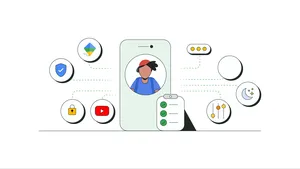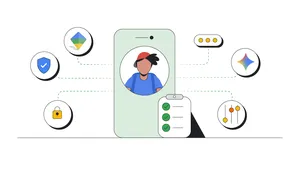Protecting small businesses from scammers
Some of the most persistent online threats — scams, botnets and fraudsters — are on the rise. In addition to helping protect people through ongoing product improvements, we also take the fight to these malicious actors using the full extent of our technical and legal resources.
Earlier this year, we took proactive legal action to stop a bad actor who was using a network of fraudulent websites to scam people — particularly older Americans — with promises of puppies during the pandemic. And last year, we led the industry’s technical response to the Glupteba botnet and launched successful legal action, bringing the issue public. Legal action is an important tool for deterring fraudulent activity, imposing punitive costs for scammers, and raising public awareness.
Today we are filing a lawsuit against scammers who sought to defraud hundreds of small businesses by impersonating Google through telemarketing calls. They also created websites advertising the purchase of fake reviews, both positive and negative, to manipulate reviews of Business Profiles on Google Search and Maps. This practice exploits entrepreneurs and small businesses — and it violates our policies on deceptive content.
Often, online scams are simply age-old tricks cloaked in new tools. That’s the case in this suit against a group of individuals who tried to charge people for Business Profiles — a service we provide for free.
A Business Profile is a tool that allows business owners to take charge of the way their business appears on Search and Maps. And it allows consumers to find their favorite (or, soon-to-be favorite) coffee shops, restaurants or hardware stores. It’s a tool designed to empower people. However, some scammers have tried to abuse and profit from it through deceptive and predatory practices. In 2021 alone, we stopped more than 12 million attempts from bad actors to create fake Business Profiles and nearly 8 million attempts from bad actors to claim Business Profiles that didn’t belong to them.
Today’s legal action is one part of our ongoing commitment to protect people, fight fraud, and do our part to stop malicious actors. This is important because scams disproportionately target individuals, small businesses and those without the resources to protect themselves. It’s key to establishing legal precedent for a safer web. We also want to share some tips to help people recognize scams and take action:
- Take your time. It’s likely not that urgent. Give yourself a moment to ask questions and avoid being rushed into a bad situation.
- When in doubt, hang up. If you receive an unwanted or unexpected call from someone who claims to be an official representative of an organization and asks for money, feel free to hang up anytime.
- Do your research. Search online to double check the details you’re getting. Look up the company or organization (or person) the caller claims to represent and get in touch with them directly. Google, for example, will never call and ask you for payment information over the phone.
- Report it to help others avoid scams. If you're in the US and continue to receive unwanted calls, you can submit a complaint to the Federal Trade Commission (FTC). To file a formal complaint, go to www.donotcall.gov or call 1-888-382-1222.
- Learn how Google can help. You can also help us track calls that falsely associate themselves with Google by contacting us directly via our webform.






